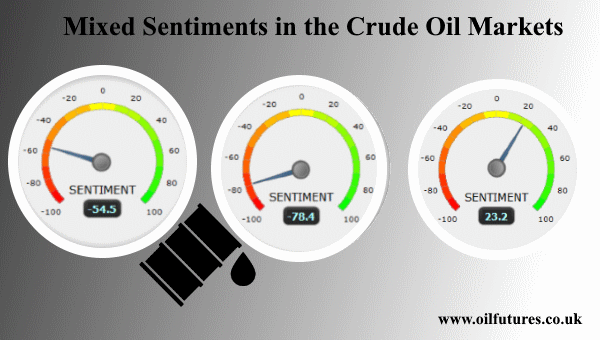Analysts are keen on watching the developments in
the crude oil markets on Monday, having witnessed a tumultuous week, where the
investor sentiment oscillated between two forms of unpredictability that
corresponded with a sharp fall in price, followed by a fragile recovery.
On Tuesday, the API, American Petroleum Institute,
predicted yet another US crude inventory draw, but by a modest amount – 869000
million barrels. On Wednesday, however, the EIA, Energy Information
Administration, released its own figures that showed a crude inventory build-up
of 3.6 million barrels.
Not only did the last figure unsettle the markets,
but also made the positive sentiments that had been hanging over the markets
for months, reflected strongly by the upward trend of the oil price, just
vanish in a matter of hours.
When I subjected three articles from sites today, directly linked to crude oil markets, to a Machine Learning algorithm that measures the sentiment, what you see on the top of the article was produced; the sentiment seems to be pretty negative; however, it was not all doom and gloom.
The reaction by the markets last week was quite unexpected,
because by then a pair of potentially serious crises was developing around a
crucial shipping lane for the crude oil markets: the attack on an Israeli-registered
tanker followed by the piracy event on board on another tanker in the Gulf of
Oman, blamed both on Iran.
Since the twin development could easily disrupt the
supply of crude oil, as the passage is known for the movement of the 5th
of the world’s crude oil needs, analysts expected a rise in price – for obvious
reasons. The reaction of the investors, however, was the polar opposite – and the
price of crude oil dropped, indeed.
Against this backdrop, the analysts were then keen
on listening to the first major policy speech by Ebrahim Raisi, the new Iranian
president on Thursday. Much to their surprise, he was fairly conciliatory in
his tone to the rest of world in general, and to Iran’s Middle East neighbours
in particular.
Although some officials, representing the West
attended inauguration in Tehran, the Western tone again changed by the weekend
in light of a report by a US security agency, pointing the finger at Iran for
both maritime incidents.
Of course, Iran denied the responsibility for the
attack; Neither the West nor Israel, however, was prepared to accept the
Iranian narrative.
In another development, a short-lived firefight
erupted between Hezbollah of Lebanon and the IDF, Israel Defence Forces,
breaking a lull of over a decade; both sides, however, said they did not want
it to escalate further; at the weekend, however, their respective appear to
have changed again for some reason.
President Raisi, meanwhile, told the visiting
Hezbollah deputy leader that his organization was deterrence against Israel
just after the inauguration of the former, something that seems to be open to
interpretation in the coming weeks.
Iranian generals, meanwhile, are threatening to
retaliate in kind against what they collectively call, a ‘misadventure by
Israel or the West’.
The cumulative effect of the sentiments compels analysts
to anticipate some form of military development in the region as something
inevitable in the current circumstances. The price movements of both WTI and
Brent crude next week will indicate something in response to what prevails in
the markets at present.







